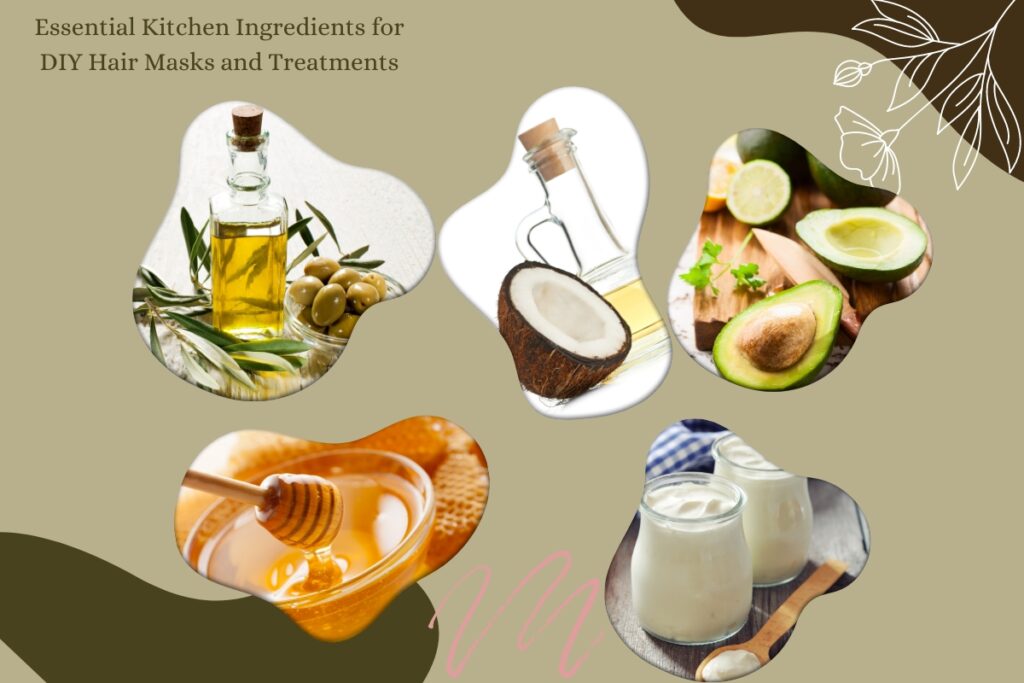How To Use Common Kitchen Ingredients For Gorgeous Hair Remedies

Overview
1. Introduction to Common Kitchen Ingredients for Hair Care
a) Understanding the Importance of Natural Hair Care
Before we delve into the specifics of different kitchen ingredients, it is essential to grasp why natural hair care is gaining popularity. Commercial hair care products often contain harsh chemicals that can strip the hair of its natural oils and cause long-term damage. On the other hand, natural ingredients are milder and offer numerous benefits, such as promoting hair growth, reducing hair loss, and improving hair texture and shine.
b) Exploring Common Kitchen Ingredients
1) Coconut Oil:
Coconut oil is a versatile ingredient that moisturizes and nourishes the hair, making it softer and more manageable. We will discuss its benefits and explore various ways to incorporate it into your hair care routine.
2) Olive Oil:
Known for its incredible moisturizing properties, olive oil provides deep conditioning to dry and damaged hair. We will explore how to use it as a hair mask or in combination with other ingredients to achieve healthy and luscious locks.
3) Honey:
Honey is not only delicious but also a fantastic ingredient for hair care. It acts as a natural conditioner, making your hair smoother and fuller. We will uncover its moisturizing and antibacterial properties and learn different methods to incorporate honey into your hair care regimen.
4) Yogurt:
Rich in protein and lactic acid, yogurt can help strengthen your hair and prevent breakage. We will explore DIY hair masks that utilize yogurt to revive and nourish your locks.
5) Eggs:
Eggs are packed with essential vitamins and minerals that promote hair growth and repair damaged hair. We will discover how to create egg-based treatments to rejuvenate your hair and add volume and shine.
6) Avocado:
Avocado is a miracle fruit for hair, offering deep nourishment and hydration. We will explore different ways to use avocados in hair masks and explain their vast array of benefits, from taming frizz to preventing split ends.
7) Lemon Juice:
Lemon juice is a natural remedy for oily hair and scalp. We will learn the correct way to use lemon juice to balance oil production and clarify your hair without causing dryness.
8) Aloe Vera:
Aloe vera is renowned for its moisturizing and soothing properties. We will explore how to extract aloe vera gel and utilize it for various hair care purposes, including promoting hair growth and reducing dandruff.
By harnessing the natural goodness of these ingredients, you can transform your hair and maintain its health and vitality. In the following topics, we will dive deeper into each ingredient, providing detailed instructions and recipes for creating effective hair treatments. Get ready to embark on a journey towards beautiful, nourished, and naturally gorgeous hair!
2. DIY Hair Masks and Treatments using Kitchen Ingredients
a) Introduction
In this topic, we will explore the world of DIY hair masks and treatments using common ingredients found in your kitchen. Many kitchen ingredients possess natural properties that can nourish and revitalize your hair, promoting its health and beauty. By learning the techniques and recipes for creating homemade hair masks and treatments, you can enhance your hair care routine and avoid the use of commercial products that may contain harmful chemicals.
b) Benefits of DIY Hair Masks and Treatments
Using kitchen ingredients for hair masks and treatments offers several advantages:
- Cost-effective: DIY hair masks and treatments are often much more affordable than store-bought alternatives.
- Natural ingredients: By utilizing kitchen ingredients, you can ensure that your hair treatments are free from synthetic chemicals and additives.
- Customizable recipes: You have the flexibility to tailor a hair mask or treatment to address your specific hair concerns and needs.
- Fun and creative: Experimenting with different ingredients and combinations can be a fun and creative process, allowing you to enjoy a personalized hair care experience.
c) Essential Kitchen Ingredients for DIY Hair Masks and Treatments
Various kitchen ingredients can provide specific benefits when used in hair masks and treatments. Here are a few examples:

1) Olive Oil
Olive oil is rich in antioxidants and healthy fats that can moisturize and nourish the hair, making it softer and shinier. It can also help reduce dandruff and strengthen hair strands.
2) Coconut Oil
Coconut oil is a popular choice for deep conditioning treatments. Its high concentration of lauric acid helps to penetrate the hair shaft, providing hydration and reducing protein loss. This ingredient is especially beneficial for dry or damaged hair.
3) Avocado
Avocado is a natural source of vitamins A, D, and E, as well as fatty acids that can moisturize and repair hair. It can help improve hair texture, prevent breakage, and add shine to your locks.
4) Honey
Honey is known for its humectant properties, which can attract and retain moisture in the hair. It nourishes and softens the hair follicles, making it an excellent ingredient for dry or frizzy hair.
5) Yogurt
Yogurt contains lactic acid, which helps cleanse the scalp and exfoliate dead skin cells. Additionally, the proteins in yogurt can strengthen and repair damaged hair, reducing breakage and promoting hair growth.
3. DIY Hair Masks and Treatments Recipes
Here are some simple and effective recipes for DIY hair masks and treatments using the kitchen ingredients mentioned above:
a) Olive Oil and Honey Hair Mask
Ingredients:
- 2 tablespoons of olive oil
- 1 tablespoon of honey
Instructions:
- Mix the olive oil and honey into a smooth paste.
- Apply the mixture to damp hair, starting from the roots and working your way down to the ends.
- Massage the mask into your scalp and hair.
- Leave the mask on for 30 minutes to an hour.
- Rinse thoroughly with lukewarm water and shampoo as usual.
b) Coconut Oil and Avocado Hair Treatment
Ingredients:
- 2 tablespoons of coconut oil
- 1 ripe avocado
Instructions:
- Mash the avocado until it forms a smooth paste.
- Add the coconut oil to the mashed avocado and mix well.
- Apply the mixture to clean, damp hair and massage it into your scalp.
- Cover your hair with a shower cap or towel and leave the treatment on for 30 minutes to an hour.
- Rinse your hair thoroughly with lukewarm water and shampoo as usual.
c) Yogurt and Honey Scalp Scrub
Ingredients:
- ½ cup of plain yogurt
- 1 tablespoon of honey
Instructions:
- Mix the yogurt and honey together until well combined.
- Part your hair into sections and apply the mixture directly to your scalp.
- Gently massage the mixture into your scalp, using circular motions to exfoliate.
- Leave the scrub on for 10-15 minutes.
- Rinse your hair and scalp thoroughly with lukewarm water and shampoo as usual.
4. Natural Remedies for Common Hair Problems using Kitchen Ingredients
Hair problems such as dryness, dandruff, hair loss, and dullness are common issues that many people face. While there are several commercial hair products available in the market to tackle these problems, they often contain harsh chemicals that can further damage the hair. Instead, using natural remedies with kitchen ingredients can be a safer and more effective solution. In this topic, we will explore various kitchen ingredients and their natural remedies for common hair problems.
a) Dry Hair
Dry hair can be a result of several factors, including overuse of hot styling tools, exposure to harsh weather, or excessive shampooing. Here are some natural remedies using kitchen ingredients to combat dryness and bring back the natural moisture of your hair:
- Coconut Oil: Applying warm coconut oil on the scalp and hair strands helps lock in moisture. Massage it gently, leave it overnight, and rinse it off with a mild shampoo the next morning.
- Avocado: Create a hair mask by mashing a ripe avocado and mixing it with a tablespoon of olive oil. Apply this mixture to your hair and let it sit for 20-30 minutes before washing it off. Avocado’s natural oils will hydrate your hair.
b) Dandruff
Dandruff is a common scalp condition caused by the overgrowth of yeast or dry skin flakes. Here are some natural remedies using kitchen ingredients to treat dandruff:
- Apple Cider Vinegar: Mix equal parts of apple cider vinegar and water in a spray bottle. After shampooing, spray this solution onto your scalp, massage gently, and leave it on for 5 minutes before rinsing. Apple cider vinegar’s acidic properties help restore the pH balance of the scalp.
- Baking Soda: Wet your hair and sprinkle a tablespoon of baking soda onto your scalp. Gently massage it for a minute or two and rinse thoroughly. Baking soda aids in exfoliating the scalp, reducing dandruff flakes.
c) Hair Loss
Hair loss can be distressing and can be caused by various factors such as hormonal imbalances, nutritional deficiencies, or excessive use of chemical hair products. Here are some natural remedies using kitchen ingredients that can help prevent hair loss:
- Onion Juice: Extract juice from an onion and apply it to your scalp using a cotton ball. Leave it on for 30 minutes to an hour before washing your hair. Onion juice contains sulfur, which promotes hair growth and prevents hair loss.
- Aloe Vera: Take fresh aloe vera gel and apply it to your scalp. Leave it on for an hour before washing it off. Aloe vera contains enzymes that stimulate hair growth by nourishing the hair follicles.
d) Dull Hair
Dull hair can be caused by a build-up of styling products, pollution, or improper hair care. Here are some natural remedies using kitchen ingredients to bring back the shine in your hair:
- Lemon Juice: Squeeze the juice of a lemon and mix it with a cup of water. Use this mixture as a final rinse after shampooing and conditioning your hair. Lemon juice’s acidic properties help remove product build-up and add shine.
- Egg Mask: Whisk an egg and add a tablespoon of olive oil. Apply this mixture to your hair and scalp and leave it on for 20 minutes. Rinse it off with lukewarm water. Eggs are rich in protein and can revitalize dull hair.
Using these natural remedies with kitchen ingredients can help address common hair problems without resorting to harsh chemical treatments. Incorporate these remedies into your hair care routine for healthier and more beautiful hair.

